Looking back at 2016 (2/2)

© 2017 EPFL
Slowing the aging process, improving data security, enabling paraplegics to walk again, transporting vaccines at room temperature to warm countries, creating jobs with the CHF 400 million raised by spin-offs – those are just some of the many areas where EPFL scientists have made a lasting contribution.
Pomegranates finally reveal their powerful anti-aging secret
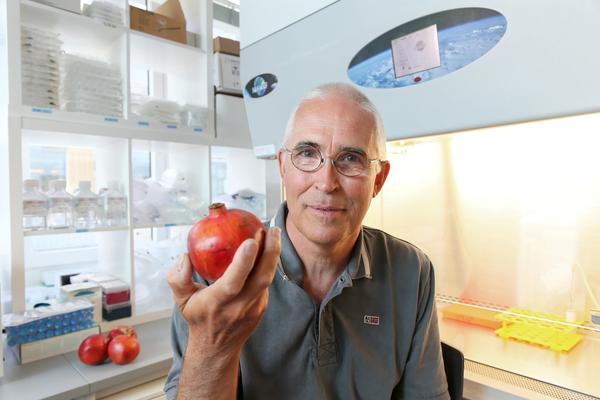 11.07.16 – Pomegranates have finally revealed their powerful anti-aging secret. A team of scientists from EPFL and the company Amazentis have shown how a molecule in pomegranates, transformed by microbes in the gut, enables muscle cells to protect themselves against one of the major causes of aging. In nematodes and rodents, the effect is nothing short of amazing. The discovery was published in Nature Medicine in July, and human clinical trials are currently underway.
11.07.16 – Pomegranates have finally revealed their powerful anti-aging secret. A team of scientists from EPFL and the company Amazentis have shown how a molecule in pomegranates, transformed by microbes in the gut, enables muscle cells to protect themselves against one of the major causes of aging. In nematodes and rodents, the effect is nothing short of amazing. The discovery was published in Nature Medicine in July, and human clinical trials are currently underway.
More than two million dollars to rethink cybersecurity
 28.07.16 – Is antivirus software already dead? That’s certainly what George Candea believes, and he’s not the only computer security expert who says so. Together with some of his former PhD students, the EPFL professor founded Cyberhaven, a startup that is developing a brand new approach to computer security. Their idea is to neutralize malware instead of trying to block it. Cyberhaven’s solution safeguards sensitive documents together with the relevant applications in a safe haven. The firm – whose R&D is carried out at Innovation Park – raised 2.7 million dollars in July.
28.07.16 – Is antivirus software already dead? That’s certainly what George Candea believes, and he’s not the only computer security expert who says so. Together with some of his former PhD students, the EPFL professor founded Cyberhaven, a startup that is developing a brand new approach to computer security. Their idea is to neutralize malware instead of trying to block it. Cyberhaven’s solution safeguards sensitive documents together with the relevant applications in a safe haven. The firm – whose R&D is carried out at Innovation Park – raised 2.7 million dollars in July.
An effective and low-cost solution for storing solar energy
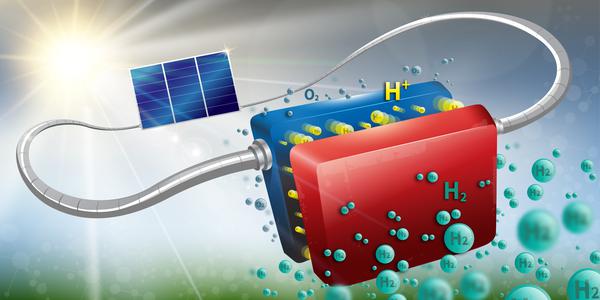 25.08.16 – Can solar energy be stored for periods when the sun doesn’t shine? Using commercially available solar cells and none of the usual rare metals, researchers at EPFL and CSEM have now designed a device that outperforms in stability, efficiency and cost. Their promising system converts the energy into hydrogen through water electrolysis. It uses the electrical current produced by a solar panel to ‘split’ water molecules into hydrogen and oxygen. The clean hydrogen can then be stored away for future use to produce electricity on demand, or even as a fuel. Their research was published in Journal of the Electrochemical Society in August.
25.08.16 – Can solar energy be stored for periods when the sun doesn’t shine? Using commercially available solar cells and none of the usual rare metals, researchers at EPFL and CSEM have now designed a device that outperforms in stability, efficiency and cost. Their promising system converts the energy into hydrogen through water electrolysis. It uses the electrical current produced by a solar panel to ‘split’ water molecules into hydrogen and oxygen. The clean hydrogen can then be stored away for future use to produce electricity on demand, or even as a fuel. Their research was published in Journal of the Electrochemical Society in August.
An EPFL startup makes residential solar panels twice as efficient
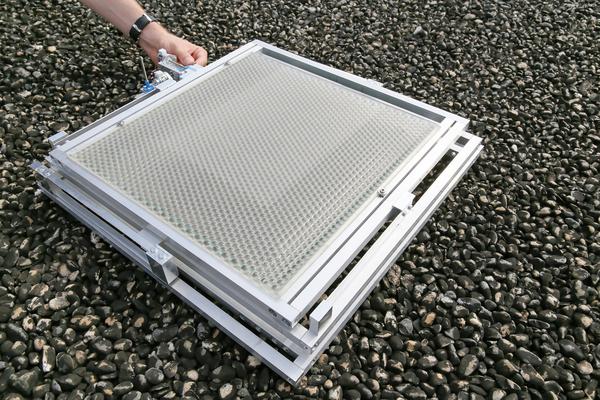 07.09.16 – With a 36% yield, the solar panels developed by startup Insolight could deliver up to twice as much energy as traditional panels. These results, which could represent a world record, were validated on a prototype in August by an independent lab. The new system uses a flat and very thin device to focus the sun’s rays on the tiny surface area of very high performance cells, and therefore deliver exceptional efficiency.
07.09.16 – With a 36% yield, the solar panels developed by startup Insolight could deliver up to twice as much energy as traditional panels. These results, which could represent a world record, were validated on a prototype in August by an independent lab. The new system uses a flat and very thin device to focus the sun’s rays on the tiny surface area of very high performance cells, and therefore deliver exceptional efficiency.
Technology gets disabled people back on their feet
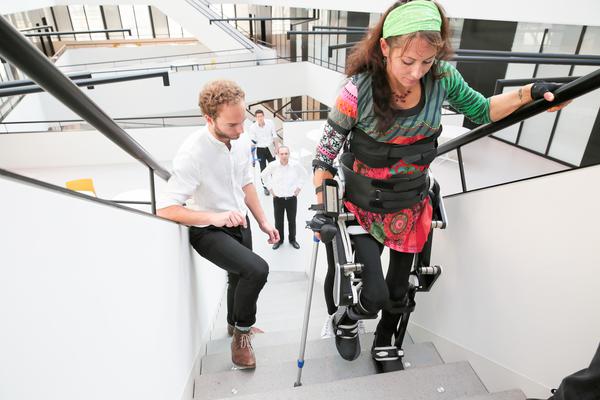 06.10.16 – Stand up. Take a few steps. Change direction. Climb some steps. Navigate around an object on the ground. Sit back down. Most people take these everyday movements for granted, but for people with paraplegia, they’re simply impossible. All that may change now thanks to an exoskeleton called TWIICE. This walking assist device, developed entirely at EPFL’s Robotic Systems Laboratory (LSRO), was used at the 2016 Cybathlon – the first competition for disabled athletes who use various assistive technologies – which took place in Zurich on 8 October.
06.10.16 – Stand up. Take a few steps. Change direction. Climb some steps. Navigate around an object on the ground. Sit back down. Most people take these everyday movements for granted, but for people with paraplegia, they’re simply impossible. All that may change now thanks to an exoskeleton called TWIICE. This walking assist device, developed entirely at EPFL’s Robotic Systems Laboratory (LSRO), was used at the 2016 Cybathlon – the first competition for disabled athletes who use various assistive technologies – which took place in Zurich on 8 October.
Bacteria can make underground nuclear waste repositories safer
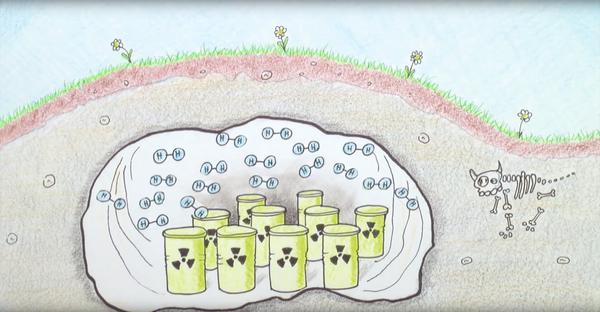 14.10.16 – Scientists may have found an unexpected ally in the long-term disposal of nuclear waste. A research team led by EPFL has discovered a microbial community that lives naturally hundreds of meters underground – in the very rock layers that have been chosen to host Swiss nuclear waste. A study published in Nature Communications in October shows that the bacteria consume the hydrogen that accumulates as the steel canisters bearing the waste corrode. If left unchecked, this hydrogen could affect the integrity of the host rock. By tweaking the design of nuclear waste repositories, the bacteria could be used to make them safer.
14.10.16 – Scientists may have found an unexpected ally in the long-term disposal of nuclear waste. A research team led by EPFL has discovered a microbial community that lives naturally hundreds of meters underground – in the very rock layers that have been chosen to host Swiss nuclear waste. A study published in Nature Communications in October shows that the bacteria consume the hydrogen that accumulates as the steel canisters bearing the waste corrode. If left unchecked, this hydrogen could affect the integrity of the host rock. By tweaking the design of nuclear waste repositories, the bacteria could be used to make them safer.
Preserve the Alps by giving up chalets
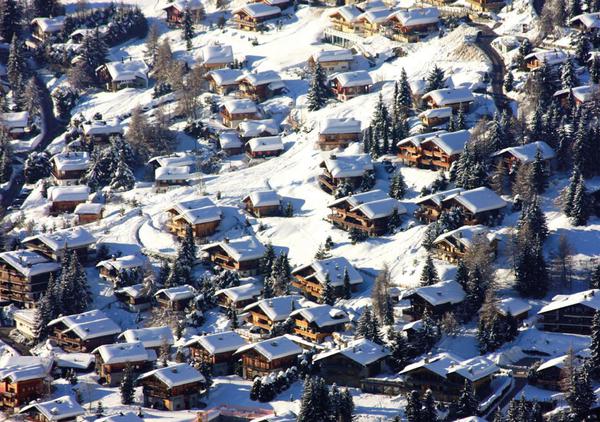 01.11.16 – Winter resorts will need to increase their density to prevent their decline. A number of Switzerland’s ski resorts are reaching a point of saturation, with peak-time traffic jams, buildings popping up in avalanche zones, and general encroachment upon the natural surroundings. While the current trend is to stop construction, an EPFL doctoral thesis suggests that the opposite might actually be necessary: we need to invest in these regions, increase their density, and ensure seamless public transportation to and from them. PhD student Fiona Pià has offered concrete and innovative solutions for Verbier, a typical example of the problems that winter resorts face today.
01.11.16 – Winter resorts will need to increase their density to prevent their decline. A number of Switzerland’s ski resorts are reaching a point of saturation, with peak-time traffic jams, buildings popping up in avalanche zones, and general encroachment upon the natural surroundings. While the current trend is to stop construction, an EPFL doctoral thesis suggests that the opposite might actually be necessary: we need to invest in these regions, increase their density, and ensure seamless public transportation to and from them. PhD student Fiona Pià has offered concrete and innovative solutions for Verbier, a typical example of the problems that winter resorts face today.
Primates regain control of paralyzed limb
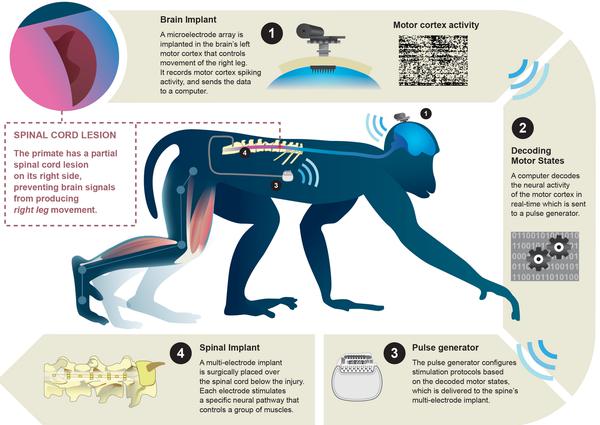 09.11.16 – In June 2015, a primate with a spinal cord injury regained control of its paralyzed leg with the help of a neuroprosthetic system called the “brain-spine interface” that bypassed the lesion, restoring communication between the brain and the region of the spinal cord. “This is the first time that neurotechnology has restored locomotion in primates,” said neuroscientist Grégoire Courtine, who led the collaboration and holds the IRP chair in spinal cord repair. “But there are many challenges ahead and it may take several years before all the components of this intervention can be tested in people.”
09.11.16 – In June 2015, a primate with a spinal cord injury regained control of its paralyzed leg with the help of a neuroprosthetic system called the “brain-spine interface” that bypassed the lesion, restoring communication between the brain and the region of the spinal cord. “This is the first time that neurotechnology has restored locomotion in primates,” said neuroscientist Grégoire Courtine, who led the collaboration and holds the IRP chair in spinal cord repair. “But there are many challenges ahead and it may take several years before all the components of this intervention can be tested in people.”
Red squirrels in the British Isles are infected with leprosy bacteria
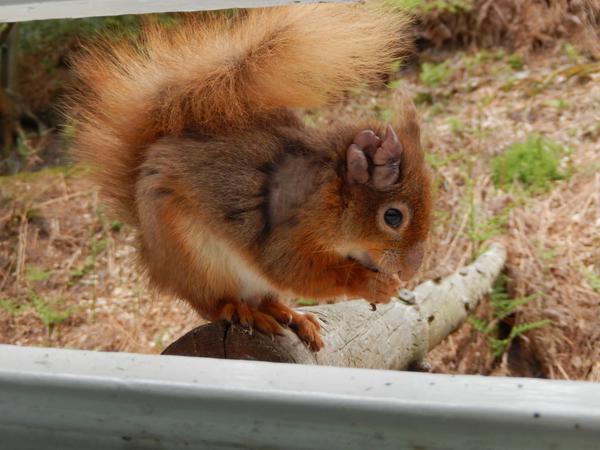 10.11.16 – Examining diseased red squirrels from England, Ireland and Scotland, scientists at EPFL and the University of Edinburgh have discovered that the same bacteria that cause leprosy in humans also infect red squirrels. About a century ago, leprosy in Europe virtually disappeared, at least among humans. Their study, published in Science in November, shows how a pathogen can remain undetected in the environment after it has been cleared from the human population.
10.11.16 – Examining diseased red squirrels from England, Ireland and Scotland, scientists at EPFL and the University of Edinburgh have discovered that the same bacteria that cause leprosy in humans also infect red squirrels. About a century ago, leprosy in Europe virtually disappeared, at least among humans. Their study, published in Science in November, shows how a pathogen can remain undetected in the environment after it has been cleared from the human population.
A method for storing vaccines at room temperature
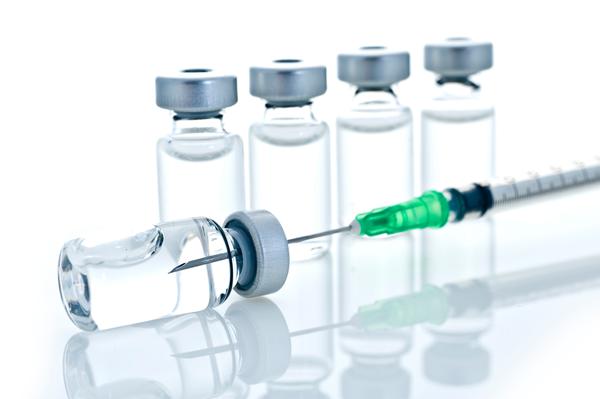 30.11.16 – Shipping vaccines in an unbroken temperature-controlled supply chain (a ‘cold chain’) all the way to recipients is a major logistical and financial challenge in remote areas and developing countries. According to Doctors Without Borders, the need to keep vaccines within a temperature range of 2-8°C is one of the main factors behind low immunization-coverage rates. Researchers at EPFL’s Supramolecular Nanomaterials and Interfaces Laboratory, in collaboration with scientists in Milan, Turin, Leiden and Oregon, have come up with three simple and inexpensive vaccine additives to get around this obstacle. They were able to stabilize vaccines at room temperature for several months.
30.11.16 – Shipping vaccines in an unbroken temperature-controlled supply chain (a ‘cold chain’) all the way to recipients is a major logistical and financial challenge in remote areas and developing countries. According to Doctors Without Borders, the need to keep vaccines within a temperature range of 2-8°C is one of the main factors behind low immunization-coverage rates. Researchers at EPFL’s Supramolecular Nanomaterials and Interfaces Laboratory, in collaboration with scientists in Milan, Turin, Leiden and Oregon, have come up with three simple and inexpensive vaccine additives to get around this obstacle. They were able to stabilize vaccines at room temperature for several months.
A record for EPFL's startups: close to CHF 400 million raised in 2016
 14.12.16 – By mid-December 2016, EPFL startups had raised a total of CHF 397 million for the year. That's 50% more than in 2014, when the figure reached CHF 242 million. Spin-offs – companies founded as a result of technology developed in an EPFL lab or created by a campus researcher – saw the largest increase in funding. They raised CHF 261 million, including CHF 100 million for Mindmaze alone. Other companies located in EPFL’s Innovation Park raised CHF 76 million, and AC Immune began trading on Nasdaq, adding a further CHF 60 million. In all, EPFL startups have raised more than CHF 100 million a year since 2010.
14.12.16 – By mid-December 2016, EPFL startups had raised a total of CHF 397 million for the year. That's 50% more than in 2014, when the figure reached CHF 242 million. Spin-offs – companies founded as a result of technology developed in an EPFL lab or created by a campus researcher – saw the largest increase in funding. They raised CHF 261 million, including CHF 100 million for Mindmaze alone. Other companies located in EPFL’s Innovation Park raised CHF 76 million, and AC Immune began trading on Nasdaq, adding a further CHF 60 million. In all, EPFL startups have raised more than CHF 100 million a year since 2010.
Three months in the Antarctic to unlock the secrets of our climate
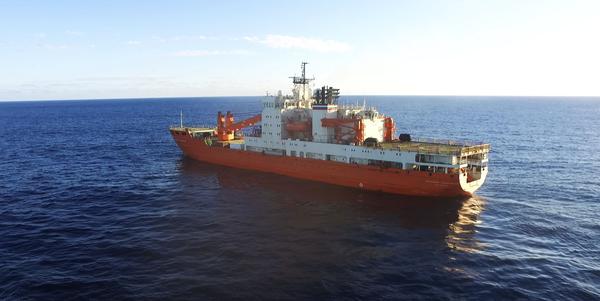 20.12.16 – The Antarctic Circumnavigation Expedition (ACE), the first project run by the Swiss Polar Institute, set sail from Cape Town, South Africa on 20 December for a trip around the South Pole. The Akademik Treshnikov is an imposing Russian research vessel with over 120 people on board: some 60 researchers from different countries and about the same number of crew members. The three-month expedition will circumnavigate Antarctica and visit around 12 subantarctic islands, since this region plays a key role in climate regulation.
20.12.16 – The Antarctic Circumnavigation Expedition (ACE), the first project run by the Swiss Polar Institute, set sail from Cape Town, South Africa on 20 December for a trip around the South Pole. The Akademik Treshnikov is an imposing Russian research vessel with over 120 people on board: some 60 researchers from different countries and about the same number of crew members. The three-month expedition will circumnavigate Antarctica and visit around 12 subantarctic islands, since this region plays a key role in climate regulation.